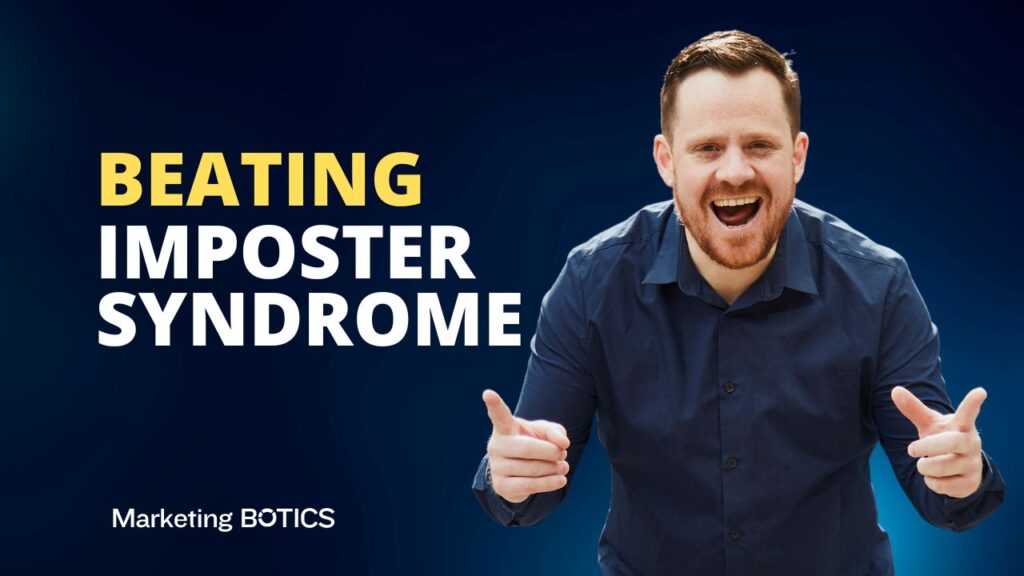When I was 18, I decided it was time to embark on my dream to become an actor. I was willing to give up everything to do it. My college course studying electrical engineering, my free room and board with my parents, though honestly, that wasn’t as hard to give up, but most was my girlfriend at the time. I knew the distance would break us up, but my desire to become an actor was too great. So with a part-time job, I applied and got £15k in loans, and off I went. Paying that back is another story.
I mention this to show how dedicated I was to performing and being seen. I never had an issue being vocal; my parents often said I was a little too good at it. So with this type of confidence, how on earth can I suffer from imposter syndrome? But I do, maybe always have. Perhaps, being someone else on stage was more straightforward than being myself.
Now I’ve hit 40, there’s a lot to explore.
So, welcome to a captivating exploration of imposter syndrome when marketing your business online. This insightful blog will delve into the challenges and triumphs of overcoming self-doubt and imposter syndrome. As business owners, we often find ourselves wrestling with the fear of not being knowledgeable enough, the pressure to measure up to industry influencers, and the constant worry of making mistakes. Whether you’re running a marketing business like me, an e-commerce company, an event business or a consultancy, there are influencers in all sectors that can make us feel like an imposter when marketing.

Admitting that it’s there.
I’ve discovered that imposter syndrome can manifest in various ways, impacting our confidence, decision-making, and overall performance, and for me, the journey to overcoming imposter syndrome begins with acknowledging its presence and understanding its origins. If you’re thinking, ‘I don’t have imposter syndrome; I just don’t want to market myself’, ‘I have a face for radio’, ‘I don’t have the voice for it’, or ‘I just don’t have time to market online’. I challenge you to consider that those are excuses that cover for imposter syndrome.
Looking into this further, and for those around my age and above, I believe the rise of social media has unexpectedly triggered the development of imposter syndrome. When I started in this field, I wasn’t expecting the need to make as much self-promotion material as I do now. I thought I’d hit a few network meetings and some follow-up calls, and all will be fine, but we’re now expected to be everywhere, LinkedIn, Facebook, Instagram and possibly even TikTok; the opportunity to be seen and criticised is vast, and I think, subconsciously, we all know it.
Let’s blame social media.
As highlighted above, for me, the cause is, without a doubt, the fast-paced world of marketing, which has grown quickly since the creation of social media. With the rise of influencers and their stories, it’s easy to fall into the trap of believing that success for any product or service should be immediate. We see it everywhere, “Get Rich In 5 Days”, “Make £5000 per month in as little as seven days”, and “This product will make an impact on your business tomorrow”; and if you aren’t able to do that, or recommend a solution that gives your client immediate success, you can easily believe you’re not as good or as attractive as others that can. And what’s worse is that now everyone can see comments, and that’s a fear.
Is it imposter syndrome? I say it is.
However, these so-called influencers aren’t telling you the truth. You know it, I know it, but these people have massive platforms that can easily drown you out. They can make you feel insignificant. You are stepping on their toes, telling their audience something different. It’s scary; what if they comment saying something that makes you seem stupid or wrong? Back to the above statement of ‘everyone can see the comments’? What if they make you feel like an imposter in their world, your world?

Simple Steps to Overcoming Imposter Syndrome
It may sound simple, but to conquer imposter syndrome, we must develop strategies that promote self-assurance and combat self-doubt. So here are my simple steps, the so-called strategy I’ve implemented to overcome imposter syndrome.
-
Stop worrying about what others think.
Ha, that sounds so simple compared to what it actually takes, but honestly, it’s what we need to start trying to do. One of my favourite sayings is ‘Fake it until you make it’, and it applies so well to this. If you can’t stop worrying, just do whatever you can to make yourself visible and see what happens. Personally, it’s do as I say and not as I do, because I too, have been planning to start step one for weeks now and still finding excuses; I am holding back at the time of writing, but I promise to start on Monday.
-
Stop reading what others say, including competitors.
Some marketing professionals will tell you it’s important to consume content and see what your competitors are up to. I get that, but not when you have imposter syndrome. I’ve met many people who use social media to promote themselves but never use it to see or consume content. This way, they are protected from seeing influencers’ highly manipulated content, such as what I mentioned above. They live in their bubble, which is amazing. You wouldn’t believe the number of times I’ve made a video and decided against posting it after seeing a competitor’s post.
-
Celebrate the small things.
For me, a really effective approach is to celebrate small victories and recognise our accomplishments along the way. Reframing our thoughts and adopting a growth mindset can shift our perspective and build confidence in our abilities. So instead of worrying about being seen by millions, or getting negative comments from haters when our video goes viral, set expectations and celebrate when you get to 100 views or hits. Then 500, 1000 and so on.
-
Supportive Communities and Encouragement
Following on from above, to hit those mile markers, do it old school and focus on smaller networks of like-minded individuals. Surround yourself with supportive peers and mentors, allowing us to share our experiences, gain valuable insights, and receive encouragement during moments of self-doubt. Remember, we are not alone in our struggles, and collective support can help us navigate the path to self-assurance. This can be done online; you don’t actually need an in-person support group.
I like to use Linkedin because its algorithm is there to help you. Even though you might have 4000, or 5000 connections on Linkedin, the platform will only send your video or written post to a small group of people that it feels will benefit from the content, normally it’s those that have engaged with your content before; this means that your content becomes more popular reaching more people each time, your confidence will grow too. The other social platforms do the same, but I find Linkedin to be the most forgiving and the people on it more friendly. If your post doesn’t receive any likes or comments, tag a friend in the comments that you know will happily engage with you. Remember the phrase above ‘Fake it until you make it’.
Unleashing Your True Potential
By embracing vulnerability, challenging unrealistic expectations, and seeking support, we can gradually overcome imposter syndrome and unleash our full potential as marketers. It’s important to recognise that growth takes time and that mistakes are an integral part of the learning process; those close to you, the networking groups that you have set up, will give you the space to explore your voice. By embracing the journey and focusing on continuous improvement, we can build confidence, overcome self-doubt, and excel in our professional endeavours.

It’s more common than you think.
I believe that it’s essential to recognise that imposter syndrome is a common experience among professionals, even those who appear confident and accomplished. But by sharing our personal stories and embracing vulnerability, we can create a supportive environment that fosters growth and encourages others to confront their own imposter syndrome. But it’s down to the age-old question, who wants to go first? Who wants to be that one that says, ‘I suffer from imposter syndrome, help me’?
Conclusion
Imposter syndrome may cast a shadow of self-doubt, but with the right mindset and strategies, we can overcome its grip and emerge stronger and more self-assured. By acknowledging our accomplishments, seeking support, and reframing our thoughts, we can navigate the challenges of the marketing world with confidence and authenticity.
Remember, you are not alone in this journey. Many professionals, including successful marketers, have experienced imposter syndrome at some point in their careers. By embracing vulnerability and sharing our stories, we can create a supportive community that uplifts and encourages one another.
As you embark on your journey to beat imposter syndrome, remember that success is not defined by immediate recognition or flawless execution. It is a process of growth, learning, and continuous improvement. Celebrate your achievements, no matter how small, and acknowledge the progress you make along the way. Each step forward is a testament to your dedication and determination.

Surround yourself with individuals who understand your struggles and can provide guidance and support. Seek out mentors and peers who have overcome imposter syndrome themselves and can offer valuable insights and encouragement. By connecting with others in the industry, you can gain new perspectives, learn from their experiences, and realise that you are not alone in this battle.
In your pursuit of beating imposter syndrome, embrace the power of positive self-talk and affirmations. Challenge negative thoughts and replace them with statements that reinforce your abilities and strengths. Remind yourself of your accomplishments and the knowledge and expertise you bring to the table. Believe in your capacity to learn and grow, and trust that you have what it takes to excel in the marketing world.
Remember, the path to overcoming imposter syndrome may not always be smooth or linear. There will be setbacks and moments of self-doubt, but it is through these challenges that we develop resilience and find our true potential. Be patient with yourself and celebrate every milestone, no matter how small. The journey is as important as the destination.
Unveiling Key Insights on Beating Imposter Syndrome
In this section, we dive into some of the most commonly asked questions:
FAQ 1: What is imposter syndrome?
Imposter syndrome refers to the persistent feeling of inadequacy or the fear of being exposed as a fraud, despite evidence of competence and accomplishments. It is a psychological pattern that often affects high-achieving individuals, leading them to doubt their abilities and attribute their success to luck or external factors.
FAQ 2: How does imposter syndrome manifest in the marketing industry?
In marketing, imposter syndrome can manifest in various ways. You may doubt your knowledge, feel insecure about your expertise compared to industry influencers, fear making mistakes that everyone can see, or constantly seek validation from others. These feelings of self-doubt can hinder professional growth, impact confidence levels and minimise marketing activities and, thus, the amount of sales.
FAQ 3: Can imposter syndrome be overcome?
Yes, imposter syndrome can be overcome with self-awareness, mindset shifts, and practical strategies. By recognising and challenging negative thought patterns, seeking support from mentors or peers, and celebrating achievements, individuals can develop resilience and boost their self-confidence. It is a journey of personal growth and continuous improvement.
FAQ 4: How can I develop self-assurance and combat imposter syndrome?
Developing self-assurance involves cultivating a positive mindset and practising self-compassion. Challenge negative self-talk by replacing it with affirmations and acknowledging your accomplishments. Set realistic goals, seek feedback, and focus on personal growth rather than comparing yourself to others. Surround yourself with a supportive network and engage in continuous learning to build confidence.
FAQ 5: Are there any resources available to help overcome imposter syndrome?
Yes, there are several resources available to help overcome imposter syndrome. Books, podcasts, websites and online courses focused on self-development and mindset can provide valuable insights and strategies. Additionally, seeking guidance from mentors, participating in supportive communities, and attending workshops or seminars can offer opportunities for learning and growth.

We hope these frequently asked questions and their answers have shed light on the topic of beating imposter syndrome in the marketing industry. By addressing common concerns and providing guidance, we aim to empower you to overcome self-doubt and embrace your true potential. Remember, you are capable, deserving, and on a journey of continuous growth.
Final thoughts and the sales bit.
In conclusion, overcoming imposter syndrome is a vital step towards unlocking your full potential in the marketing industry. By recognising your worth, challenging self-doubt, and embracing continuous growth, you can rise above the limitations of imposter syndrome and thrive in your career.
If you are an agency seeking a transformative solution for your business, I encourage you to visit my GoHighlevel page. GoHighlevel offers one of the most powerful white-label CRM and all-in-one marketing solutions, providing you with the tools and resources to enhance your agency’s success. Discover how GoHighlevel can revolutionise your agency and take it to new heights.
For those who are not agencies, I invite you to explore my other insightful blogs and content. Dive into a wealth of valuable information that covers various aspects of marketing, from social media strategies to effective email marketing techniques. These resources are designed to provide you with practical advice, inspiration, and actionable insights to elevate your marketing efforts.
Remember, imposter syndrome may present challenges, but with the right mindset and support, you can conquer it. Believe in yourself, celebrate your accomplishments, and continue to learn and grow. Together, let’s embrace the journey and create remarkable success in the world of marketing.
Don’t forget to take action and visit my GoHighlevel page if you are an agency, or explore the other engaging blogs and content for valuable marketing insights. Your success begins with overcoming imposter syndrome and unleashing your true potential.

